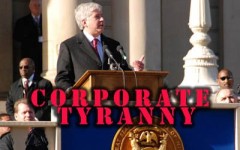Financial Martial Law
March 30, 2011
By Frank Whalen
American Free Press
In mid-March, Michigan lawmakers passed legislation that has been called “financial martial law.” Contained within it are the methods and authority to remove elected officials and replace them with appointed “emergency financial managers” who, according to CBS News, would have the authority to “fire local elected officials, break contracts, seize and sell assets, eliminate services, and even eliminate whole cities or school districts without any public input.”
The appointees selected by GOP Gov. Rick Snyder would be “accountable” only to the state legislature. The possible abuses are endless.
As online journalist Cory Doctorow reported on March 11, “This opens the door to the kind of ‘governance’ we’ve seen in occupied Iraq where high-paid appointees who don’t answer to the governed get to award no-bid contracts to their pals, with little or no oversight or control.”
Like the vast governmental powers granted in the wake of Sept. 11, 2001, citizens have the responsibility to examine the potential for corruption in a law. Michigan’s systematic dissolution of the people’s authority in government is by no means without precedent.
In February 2009 Bloomberg reported on hidden healthcare components in the Democrat-backed federal stimulus bill. Based on the recommendations of disgraced Health and Human Services secretarial nominee Tom Daschle, in his book, “Critical: What We Can Do About The Health-Care Crisis,” the stimulus bill created “an appointed body with vast powers to make the ‘tough’ decisions elected politicians won’t make.”
Specifically, the Federal Coordinating Council for Comparative Effectiveness Research “approves or rejects treatments using a formula that divides the cost of treatment by the number of years a patient is likely to benefit.”
Again, this involves appointed individuals making decisions who are not elected by or accountable to the people. The stimulus bill became a law that same month. Lord John Acton wrote in 1887, “Power tends to corrupt, and absolute power corrupts absolutely.”
Legislative examples such as the Michigan law and healthcare reform do indeed display this non-partisan desire for absolute power.
In 1776, a group of liberty-seeking men put ideas to paper in the form of the Declaration of Independence. Presenting their list of objections toward colonial rule by King George III, they wrote, “The history of the present king of Great Britain is a history of repeated injuries and usurpations, all having in direct object the establishment of an absolute tyranny over these states.” As an example, they defined George as a tyrant “for suspending our legislatures and declaring themselves invested with power to legislate for us in all cases whatsoever.”
Frank Whalen has been a radio talk show host for the past 17 years, and worked as a consultant for Maxim magazine. To read more from Frank Whalen or to tune in to his radio show, “Frankly Speaking,” go to his uncensored website at www.franklyspeakingradio.com. There you will see a vast archive of information on a wide range of topics.

